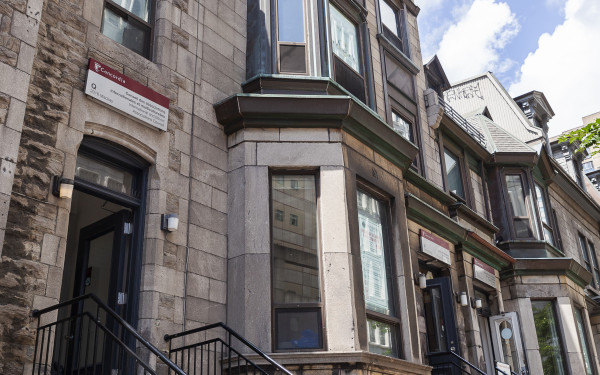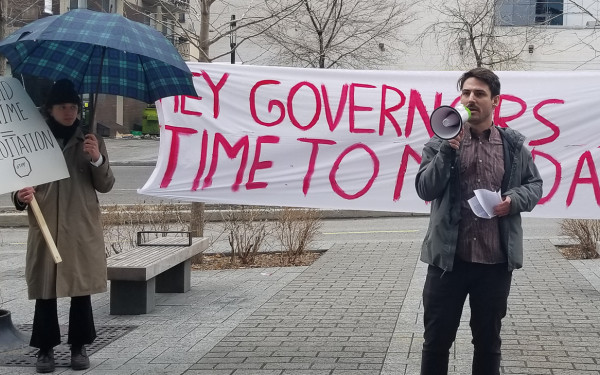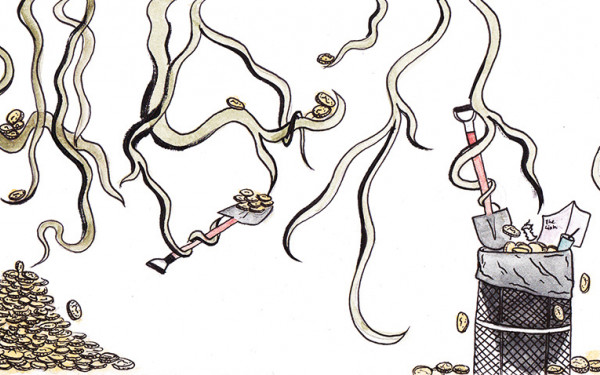TRAC Wants Resolution for Wage Disparities
Negotiations Still Stalled, New Budget Approved at General Assembly
Concordia’s engineering and computer science teaching assistants will have to wait until March 2016 before a grievance against the disparity in their wages with other faculty TAs is heard.
The union representing Teaching and Research Assistants at Concordia (TRAC) filed a grievance last September on behalf of its members over different wage scales for engineering and computer science TAs compared to wages of TAs in other faculties.
Concordia rejected the complaint, and it was sent to arbitration in March 2016, according to TRAC’s Grievance Office Gounash Pirniya.
“The problem is lab demonstrators in the engineering faculty receive $18.53 per hour, but in other faculties (Grade 1 TAs) would receive $24.68,” said Pirniya. Despite the difference in wages, both positions do the same job, she said.
Wage disparities have existed in the union since it signed its first collective agreement in 2011. TRAC’s newest collective agreement was signed in 2014 and kept the wage disparities. Pay grade negotiations for new salaries were postponed.
The new agreement solved some wage issues: the lowest pay grades for markers were scrapped altogether and bumped up to wages between $14 and $20 per hour. TAs for eConcordia—a system used for online classes—also joined the highest pay grade with a salary of $24 an hour.
But wages for engineering and computer science TAs remained separate from other faculties. Pirniya said no other university has different wages for engineering TAs.
When wages for markers were bumped up, PhD and Masters markers in other faculties started receiving $20 and $17.79 per hour respectively, but Engineering markers, regardless of the level of education, were only bumped to $17.10 per hour.
Only undergraduate TAs in other faculties are paid less, around $14 per hour.
Pirniya said nothing came out of meetings with Concordia when the complaints were filed last year. The university pointed to the collective agreement, which was signed by
TRAC and is binding until it expires.
“There could be a lot of problems with the rules and regulations, and that’s why grievances can be filed,” Pirniya said. The fact that the union agreed to the wage disparity in the past doesn’t mean it shouldn’t be changed, she added.
“It’s been a problem for years, so Concordia should at least resolve it and pay it retroactively.”
According to Pirniya, the number of TAs and RAs in the faculty of engineering is very high, and most of them are international students.
“I’m not talking as the grievance officer when I say this, but I would like to call this discriminatory rather than disparity in pay grade, because I know that engineering is one of the faculties that has the most international students,” Pirniya said. “Why is this just happening in engineering?”
Pirniya said many international engineering TAs will probably finish their studies and head home by the time the complaint is resolved.
“Even if the grievance [is resolved], a lot of them will not receive [retroactive] payments.”
This year TRAC plans to spend a lot more money on mobilization and communication to encourage members to come forward with any problems they have. Members have 20 days from the incident of complaint to bring forward grievances or labour disputes.
“These days Concordia is really strict about deadlines,” Pirniya said.
Pirniya also brought up the difference in length of the union’s contract compared to other universities. TRAC’s collective agreement is around 15 pages, while the McGill teaching assistant union’s agreement is 40 pages.
“I’m not saying that if you have 100 pages to your collective agreement that you have the best agreement ever, but it means there are a lot of points taken into account,” she said.
Concordia University spokesperson Chris Mota said the university had no comment on ongoing labour negotiations and grievances.
FOR INFOGRAPHIC
Engineering and computer science teaching assistants at Concordia have been paid according to different wage scales since the first collective agreement was signed in 2011. Students in the faculties of Arts and Science, Fine Arts, John Molson School of Business and the School of Graduate Studies are grouped together in the collective agreement and split into Grade 1 and Grade 2 pay grades, with Grade 2 wages split into PhD, Masters and Undergraduate salaries. Engineering and computer science TA wages are split into three job descriptions: Tutorial Leaders, Lab Demonstrators and Programmer or Tutor on Duty.
OTHER TRAC NEWS:
-TRAC is preparing to bargain for a new collective agreement for exam invigilators, who voted to join TRAC last year. At a general assembly last week, TRAC members also voted in favour of having invigilators join the union. TRAC President Nader Jafari Nodoushan said a request to begin negotiations was sent to Concordia.
-There is no update on when wage negotiations will resume for the 2015-2016 year. Talks are expected to continue in September, after Concordia withdrew an unfavourable offer made before summer. The union planned to raise all wages to at least $24.68 per hour for all students, but that would result in a substantial increase in the budget for teaching and research assistant salaries.
“To us, the most important thing is that our members do not have cuts to their salaries,” Nodoushan said. “Even if we have to keep the old pay grade, we’ll agree to [a smaller] percentage increase, but we won’t accept any cuts to our members’ salaries.”
Almost all TAs and RAs are students, Nodoushan said. An alternative could be waiving some tuition fees.
-TRAC will no longer have a permanent employee and is instead encouraging members to take over extra paid tasks.
“We’re not in the position to have a permanent paid employee,” Nodoushan said. “This is a very small labour union. We can use our members to help us instead of having an external employee.”
The union’s budget for the year was increased for mobilization, communications and political action.

_900_544_90.jpg)




